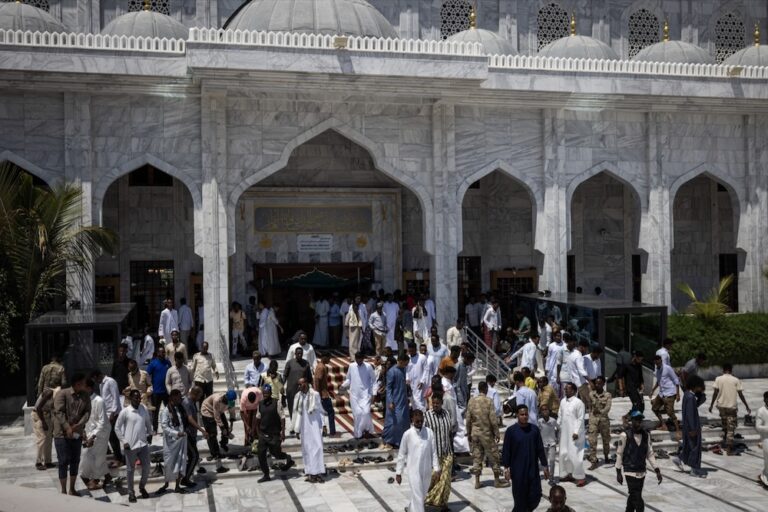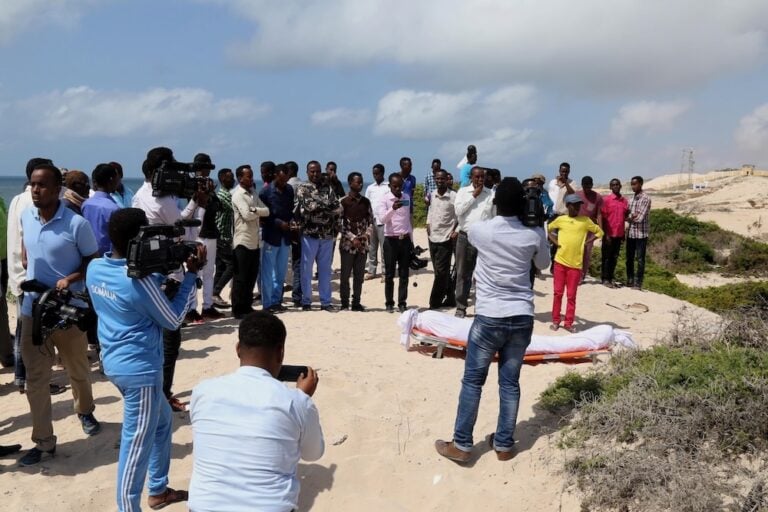(RSF/IFEX) – RSF has voiced “great concern” about threats in recent weeks against its partner organisation in Somalia, the National Union of Somali Journalists (NUSOJ, formerly SOJON), just before and after its annual general assembly in Mogadishu from 29 to 31 August 2005. “It is getting more and more difficult for Somali journalists to work,” […]
(RSF/IFEX) – RSF has voiced “great concern” about threats in recent weeks against its partner organisation in Somalia, the National Union of Somali Journalists (NUSOJ, formerly SOJON), just before and after its annual general assembly in Mogadishu from 29 to 31 August 2005.
“It is getting more and more difficult for Somali journalists to work,” RSF said. “Pushed around by warlords, Islamic courts and businessmen, they chose to defend themselves by setting up an exemplary, democratically-run organisation, which is now being targeted.”
“We appeal to the transitional federal government and its international partners to use their influence to stop these threats as soon as possible,” RSF added. “This episode highlights the urgent need to re-establish the rule of law in Mogadishu to protect the small pockets of democracy that Somalis have managed to create for themselves amid the anarchy.”
Anonymous death threats were received several times by NUSOJ leaders during the week of 22 to 28 August. Secretary-General Omar Faruk Osman and Council Chairman Mohamed Barre Haji received anonymous calls on NUSOJ lines or their mobile phones warning that they would be killed “immediately” or “within 48 hours.”
During the 10 days prior to the general assembly, a Toyota pickup with a dozen heavily-armed men aboard regularly passed in front of the NUSOJ office in the Waberi district. On 1 September, there was a stand-off between them and Barre Haji’s bodyguards. The pickup, which was equipped with an anti-aircraft gun, finally withdrew and no shots were fired.
The next day, four hooded militiamen with AK-47 assault rifles forced their way into the home of a member of NUSOJ’s executive committee, Ali Moallim Isak, who was not there at the time. The militiamen finally left after waiting for six hours without ever explaining their motives.
“We don’t know who these militiamen are or what they want,” Faruk Osman told RSF. “The only law that is respected in this country is the law of the gun. As a result, we have stepped up our protective measures. We will not let these acts of intimidation prevent us from working.”
Meanwhile, Mohamed “Siidi” Abdulle Hassan, the local correspondent for a Swedish-based news website, http://www.somaliweyn.com, was briefly kidnapped on 4 September by the militia of Yusuf Ali, the self-proclaimed governor of the central region of Hiiraan, for failing to report a press conference Ali gave in Mogadishu. The militia leader put a pistol to Siidi’s head and ordered him to tell his editor that he would be killed if a report was not published. Siidi was released after NUSOJ intervened. The self-proclaimed governor nonetheless confiscated the journalist’s equipment.


